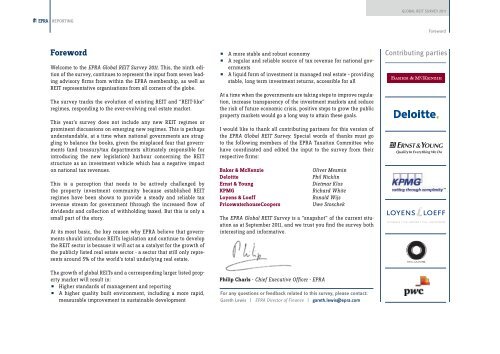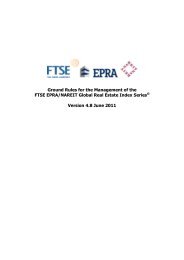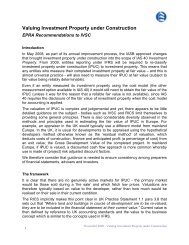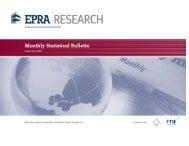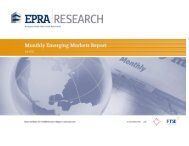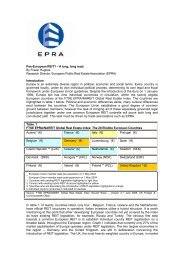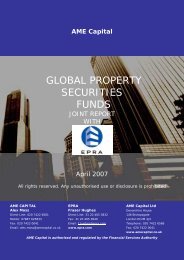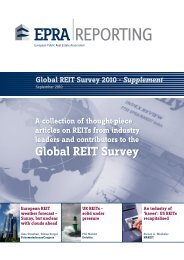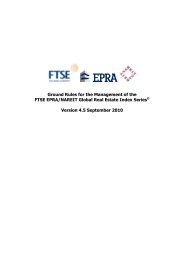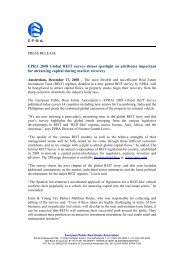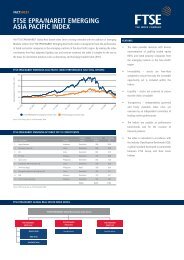Global REIT Survey 2011 - EPRA
Global REIT Survey 2011 - EPRA
Global REIT Survey 2011 - EPRA
You also want an ePaper? Increase the reach of your titles
YUMPU automatically turns print PDFs into web optimized ePapers that Google loves.
<strong>Global</strong> <strong>REIT</strong> <strong>Survey</strong> <strong>2011</strong>REPORTINGForewordForewordWelcome to the <strong>EPRA</strong> <strong>Global</strong> <strong>REIT</strong> <strong>Survey</strong> <strong>2011</strong>. This, the ninth editionof the survey, continues to represent the input from seven leadingadvisory firms from within the <strong>EPRA</strong> membership, as well as<strong>REIT</strong> representative organisations from all corners of the globe.The survey tracks the evolution of existing <strong>REIT</strong> and “<strong>REIT</strong>-like”regimes, responding to the ever-evolving real estate market.This year’s survey does not include any new <strong>REIT</strong> regimes orprominent discussions on emerging new regimes. This is perhapsunderstandable, at a time when national governments are strugglingto balance the books, given the misplaced fear that governments(and treasury/tax departments ultimately responsible forintroducing the new legislation) harbour concerning the <strong>REIT</strong>structure as an investment vehicle which has a negative impacton national tax revenues.This is a perception that needs to be actively challenged bythe property investment community because established <strong>REIT</strong>regimes have been shown to provide a steady and reliable taxrevenue stream for government (through the increased flow ofdividends and collection of withholding taxes). But this is only asmall part of the story.At its most basic, the key reason why <strong>EPRA</strong> believe that governmentsshould introduce <strong>REIT</strong>s legislation and continue to developthe <strong>REIT</strong> sector is because it will act as a catalyst for the growth ofthe publicly listed real estate sector - a sector that still only representsaround 5% of the world’s total underlying real estate.The growth of global <strong>REIT</strong>s and a corresponding larger listed propertymarket will result in:Higher standards of management and reporting• A higher quality built environment, including a more rapid,• measurable improvement in sustainable developmentA more stable and robust economy• A regular and reliable source of tax revenue for national governmentsA liquid form of investment in managed real estate – providing• stable, long term investment returns, accessible for allAt a time when the governments are taking steps to improve regulation,increase transparency of the investment markets and reducethe risk of future economic crisis, positive steps to grow the publicproperty markets would go a long way to attain these goals.I would like to thank all contributing partners for this version ofthe <strong>EPRA</strong> <strong>Global</strong> <strong>REIT</strong> <strong>Survey</strong>. Special words of thanks must goto the following members of the <strong>EPRA</strong> Taxation Committee whohave coordinated and edited the input to the survey from theirrespective firms:Baker & McKenzieDeloitteErnst & YoungKPMGLoyens & LoeffPricewaterhouseCoopersOliver MesminPhil NicklinDietmar KlosRichard WhiteRonald WijsUwe StoschekThe <strong>EPRA</strong> <strong>Global</strong> <strong>REIT</strong> <strong>Survey</strong> is a “snapshot” of the current situationas at September <strong>2011</strong>, and we trust you find the survey bothinteresting and informative.Philip Charls - Chief Executive Officer - <strong>EPRA</strong>For any questions or feedback related to this survey, please contact:Gareth Lewis | <strong>EPRA</strong> Director of Finance | gareth.lewis@epra.comContributing parties


